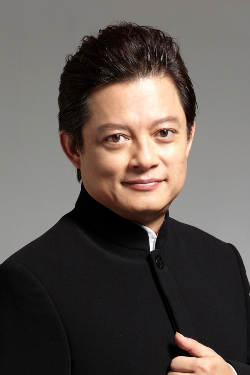Warren Mok Wah-yeun


Mr Warren Mok Wah-yeun
Honorary University Fellow (2019)
The figure of celebrated tenor Mr Warren Mok represents and transcends Hong Kong. In fact, Mr Mok conveys the best of Hong Kong’s internationalist ideals to both the world stage and the local area. As one of “China’s Three Tenors,” one who has performed since his 1987 European debut in far-flung places, one whose operatic repertoire exceeds 60 roles, an artist equally at home performing in Cantonese, German, Italian, French, English, and Putonghua, Mr Mok’s accolades are the stuff of legend.
His awards include Cavaliere dell’Ordine della Stella della Solidarietà and Officer of the Order of the Star of Italy from Italy, and Chevalier dans l'Ordre des Arts et des Lettres from France, the World Outstanding Chinese Award, the Medal of Honour from the Hong Kong Government, and World Ten Outstanding Cantones. Just as these grand roles and recognitions surpass specificities of time, location, and language, they also outstrip the dominion of opera performance. Beginning in December 1999, when he assumed the role of Artistic Director for the Macau International Music Festival, Mr Mok has likewise cultivated and shared his talents both as a producer and as a professor.
In addition to his tenor performances around the globe, his 15-plus-years in Macao elevated the region’s International Music Festival to an annual world-class event. In 2003, Mr Mok founded, and remains Artistic Director of, Opera Hong Kong, which upholds its mission of “enhancing the appreciation of opera in the city and promoting local musical talent through not only staging operas and concerts, but also offering educational programmes to reach younger audiences.” Mr Mok is also Advisor to the Shanghai Opera House, the Shanghai Symphony, the China National Opera House, and the Beijing Music Festival. Most recently, he was made a member of the Chinese People’s Political Consultative Conference. What’s more, Mr Mok continues to build bridges throughout Greater China via his Artistic Directorship of the Fujian Grand Theatre and the Zhuhai Huafa Grand Theatre, while concurrently acting as Visiting Professor at Beijing University Opera Academy, at Xinan University, and at the Shanghai Music Conservatory, as well as serving as a Distinguished Professor at South China Normal University.
These abbreviated catalogues of global, national, and local acclaim could convince us erroneously to conclude that Mr Mok, because he is so publically prolific and renowned, might be privately unapproachable or taciturn—or, even, affected. However, Honorary Professor Tony Hung of HKBU Faculty of Arts, a linguist whose professional love of learning and teaching language is only equalled by his passion for music, speaks warmly of Mr Mok’s talent as well as the affability he emits in spite of his musical genius. He describes him as a friendly and fun-loving person, totally devoid of any airs that one might associate with a star tenor.
What is so truly distinctive about Mr Mok is his commitment to international, intercultural, and intergenerational connections—an obligation, nay, a generosity, that even outshines his myriad public honours. And it is opera itself that provided Mr Mok with a life-affirming epiphany. Opera, tout court, transformed him.
Mr Mok experienced his first live opera in his first term at the University of Hawaii. He was 18 and an accounting major. Yet, after La bohème, and to the alarm of his successful Hongkonger parents, he became a voice major. Suddenly, as if ordained both from above and from within, Mr Mok found himself transmuting from timid and pragmatic introvert to personable and voluble extrovert.
“Tenors,” Mr Mok affirms, “are born, not made. Tenors are the most difficult to train.” There’s “a special resonance,” one that translates to tenors being “famous,” to tenors being “expensive in all senses.” A constant in the development of Mr Mok’s professional career that has seen him perform Cantonese Ooperas of, Mozart, and Rossini in his earlier days, and the “meaty, body repertoire” of Verdi and Puccini more recently, is his serious investment in “love,” “dedication,” and “having fun.” Though Mr Mok credits his training in America for securing his respect of personal opinions, and his performing in Germany for establishing his keen sense of self-discipline, it’s his enthusiasm for the present that proves most striking—and illuminating. “Typecasting,” he declares, “is the worst case for opera singers.” Mr Mok always brings, has always brought, his own interpretative voice to the specific roles he performs. What this means is: Mr Mok’s reading of the character’s history necessarily takes precedence over his own performance history.
It is this sense of presence, this care of character over career, this consideration of other over self, that so imbues Mr Mok with his irrefutable—and contagious—joie de vivre. Like a weightlifter honing his muscles, Mr Mok nourishes his voice with a vigilant sleep, protein, and carbohydrates regimen. And whether recalling having to swallow mosquitoes during a park performance in Guangzhou in 1993, or recounting his recent performance as Radamès in Aïida, a historical firstdemanding repertoire for a 60-year-old tenor, the true takeaway of his career is twofold: “Hopefully someone will surpass me when I die” and “No regrets.”
All of this results in a tenor, in a star, in a local, international hero, who advises the youth of today to follow in his footsteps: “learn European languages, study in the West, feel the culture.” Mr Mok adds, “Enter competitions,” while reminding future generations simply to “Sing for fun,” just as he still does—and only ever has. Opera, for him, fortifies “fragility.” “We need opera,” he says with a serious smile, “to bring people together, to enjoy life, to integrate worlds in the production and performance of opera, from lighting to orchestra, to singers, to audience.”
Yes, let’s. Let us integrate worlds!